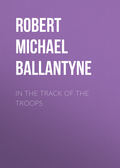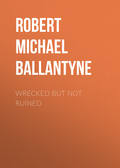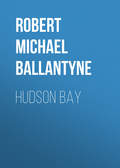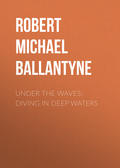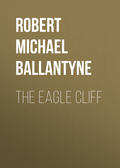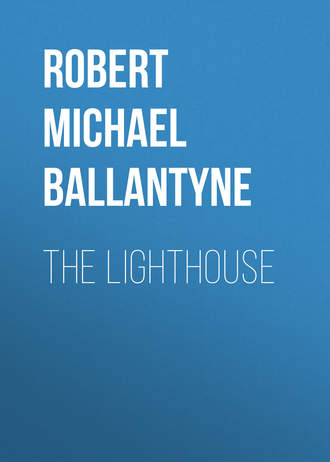
Robert Michael Ballantyne
The Lighthouse
Chapter Seventeen
A Meeting with Old Friends, and an Excursion
Next morning the captain and his nephew “bore down”, as the former expressed it, on the workyard, and Ruby was readily accepted, his good qualities having already been well tested at the Bell Rock.
“Now, boy, we’ll go and see about the little preventive craft,” said the captain on quitting the office.
“But first,” said Ruby, “let me go and tell my old comrade Dove that I am to be with him again.”
There was no need to enquire the way to the forge, the sound of the anvil being distinctly heard above all the other sounds of that busy spot.
The workyard at Arbroath, where the stones for the lighthouse were collected and hewn into shape before being sent off to the rock, was an enclosed piece of ground, extending to about three-quarters of an acre, conveniently situated on the northern side of the Lady Lane, or Street, leading from the western side of the harbour.
Here were built a row of barracks for the workmen, and several apartments connected with the engineer’s office, mould-makers’ department, stores, workshops for smiths and joiners, stables, etcetera, extending 150 feet along the north side of the yard. All of these were fully occupied, there being upwards of forty men employed permanently.
Sheds of timber were also constructed to protect the workmen in wet weather; and a kiln was built for burning lime. In the centre of the yard stood a circular platform of masonry on which the stones were placed when dressed, so that each stone was tested and marked, and each “course” or layer of the lighthouse fitted up and tried, before being shipped to the rock.
The platform measured 44 feet in diameter. It was founded with large broad stones at a depth of about 2 feet 6 inches, and built to within 10 inches of the surface with rubble work, on which a course of neatly dressed and well-jointed masonry was laid, of the red sandstone from the quarries to the eastward of Arbroath, which brought the platform on a level with the surface of the ground. Here the dressed part of the first entire course, or layer, of the lighthouse was lying, and the platform was so substantially built as to be capable of supporting any number of courses which it might be found convenient to lay upon it in the further progress of the work.
Passing this platform, the captain and Ruby threaded their way through a mass of workyard débris until they came to the building from which the sounds of the anvil proceeded. For a few minutes they stood looking at our old friend Jamie Dove, who, with bared arms, was causing the sparks to fly, and the glowing metal to yield, as vigorously as of old. Presently he ceased hammering, and turning to the fire thrust the metal into it. Then he wiped his brow, and glanced towards the door.
“What! eh! Ruby Brand?” he shouted in surprise.
“Och! or his ghost!” cried Ned O’Connor, who had been appointed to Ruby’s vacant situation.
“A pretty solid ghost you’ll find me,” said Ruby with a laugh, as he stepped forward and seized the smith by the hand.
“Musha! but it’s thrue,” cried O’Connor, quitting the bellows, and seizing Ruby’s disengaged hand, which he shook almost as vehemently as the smith did the other.
“Now, then, don’t dislocate him altogether,” cried the captain, who was much delighted with this warm reception; “he’s goin’ to jine you, boys, so have mercy on his old timbers.”
“Jine us!” cried the smith.
“Ay, been appointed to the old berth,” said Ruby, “so I’ll have to unship you, Ned.”
“The sooner the better; faix, I niver had much notion o’ this fiery style o’ life; it’s only fit for sallymanders and bottle-imps. But when d’ye begin work, lad?”
“To-morrow, I believe. At least, I was told to call at the office to-morrow. To-day I have an engagement.”
“Ay, an’ it’s time we was under weigh,” said Captain Ogilvy, taking his nephew by the arm. “Come along, lad, an’ don’t keep them waiting.”
So saying they bade the smith goodbye, and, leaving the forge, walked smartly towards that part of the harbour where the boats lay.
“Ruby,” said the captain, as they went along, “it’s lucky it’s such a fine day, for Minnie is going with us.”
Ruby said nothing, but the deep flush of pleasure that overspread his countenance proved that he was not indifferent to the news.
“You see she’s bin out of sorts,” continued the captain, “for some time back; and no wonder, poor thing, seein’ that your mother has been so anxious about you, and required more than usual care, so I’ve prevailed on the leftenant to let her go. She’ll get good by our afternoon’s sail, and we won’t be the worse of her company. What say ye to that, nephy?”
Ruby said that he was glad to hear it, but he thought a great deal more than he said, and among other things he thought that the lieutenant might perhaps be rather in the way; but as his presence was unavoidable he made up his mind to try to believe that he, the lieutenant, would in all probability be an engaged man already. As to the possibility of his seeing Minnie and being indifferent to her (in the event of his being a free man), he felt that such an idea was preposterous! Suddenly a thought flashed across him and induced a question—
“Is the lieutenant married, uncle?”
“Not as I know of, lad; why d’ye ask?”
“Because—because—married men are so much pleasanter than—”
Ruby stopped short, for he just then remembered that his uncle was a bachelor.
“’Pon my word, youngster! go on, why d’ye stop in your purlite remark?”
“Because,” said Ruby, laughing, “I meant to say that young married men were so much more agreeable than young bachelors.”
“Humph!” ejaculated the captain, who did not see much force in the observation, “and how d’ye know the leftenant’s a young man? I didn’t say he was young; mayhap he’s old. But here he is, so you’ll judge for yourself.”
At the moment a tall, deeply-bronzed man of about thirty years of age walked up and greeted Captain Ogilvy familiarly as his “buck”, enquiring, at the same time, how his “old timbers” were, and where the “bit of baggage” was.
“She’s to be at the end o’ the pier in five minutes,” said the captain, drawing out and consulting a watch that was large enough to have been mistaken for a small eight-day clock. “This is my nephy, Ruby. Ruby Brand—Leftenant Lindsay. True blues, both of ye—
“‘When shall we three meet again?
Where the stormy winds do blow, do blow, do blow,
And the thunder, lightenin’, and the rain,
Riots up above, and also down below, below, below.’
“Ah! here comes the pretty little craft.”
Minnie appeared as he spoke, and walked towards them with a modest, yet decided air that was positively bewitching.
She was dressed in homely garments, but that served to enhance the beauty of her figure, and she had on the plainest of little bonnets, but that only tended to make her face more lovely. Ruby thought it was perfection. He glanced at Lieutenant Lindsay, and perceiving that he thought so too (as how could he think otherwise?) a pang of jealousy shot into his breast. But it passed away when the lieutenant, after politely assisting Minnie into the boat, sat down beside the captain and began to talk earnestly to him, leaving Minnie entirely to her lover. We may remark here, that the title of “leftenant”, bestowed on Lindsay by the captain was entirely complimentary.
The crew of the boat rowed out of the harbour, and the lieutenant steered eastward, towards the cliffs that have been mentioned in an earlier part of our tale.
The day turned out to be one of those magnificent and exceptional days which appear to have been cut out of summer and interpolated into autumn. It was bright, warm, and calm, so calm that the boat’s sail was useless, and the crew had to row; but this was, in Minnie’s estimation, no disadvantage, for it gave her time to see the caves and picturesque inlets which abound all along that rocky coast. It also gave her time to—but no matter.
“O how very much I should like to have a little boat,” said Minnie, with enthusiasm, “and spend a long day rowing in and out among these wild rocks, and exploring the caves! Wouldn’t it be delightful, Ruby?”
Ruby admitted that it would, and added, “You shall have such a day, Minnie, if we live long.”
“Have you ever been in the Forbidden Cave?” enquired Minnie.
“I’ll warrant you he has,” cried the captain, who overheard the question; “you may be sure that wherever Ruby is forbidden to go, there he’ll be sure to go!”
“Ay, is he so self-willed?” asked the lieutenant, with a smile, and a glance at Minnie.
“A mule; a positive mule,” said the captain.
“Come, uncle, you know that I don’t deserve such a character, and it’s too bad to give it to me to-day. Did I not agree to come on this excursion at once, when you asked me?”
“Ay, but you wouldn’t if I had ordered you,” returned the captain.
“I rather think he would,” observed the lieutenant, with another smile, and another glance at Minnie.
Both smiles and glances were observed and noticed by Ruby, whose heart felt another pang shoot through it; but this, like the former, subsided when the lieutenant again addressed the captain, and devoted himself to him so exclusively, that Ruby began to feel a touch of indignation at his want of appreciation of such a girl as Minnie.
“He’s a stupid ass,” thought Ruby to himself, and then, turning to Minnie, directed her attention to a curious natural arch on the cliffs, and sought to forget all the rest of the world.
In this effort he was successful, and had gradually worked himself into the firm belief that the world was paradise, and that he and Minnie were its sole occupants—a second edition, as it were, of Adam and Eve—when the lieutenant rudely dispelled the sweet dream by saying sharply to the man at the bow-oar—
“Is that the boat, Baker? You ought to know it pretty well.”
“I think it is, sir,” answered the man, resting on his oar a moment, and glancing over his shoulder; “but I can’t be sure at this distance.”
“Well, pull easy,” said the lieutenant; “you see, it won’t do to scare them, Captain Ogilvy, and they’ll think we’re a pleasure party when they see a woman in the boat.”
Ruby thought they would not be far wrong in supposing them a pleasure party. He objected, mentally, however, to Minnie being styled a “woman”—not that he would have had her called a man, but he thought that girl would have been more suitable—angel, perhaps, the most appropriate term of all.
“Come, captain, I think I will join you in a pipe,” said the lieutenant, pulling out a tin case, in which he kept the blackest of little cutty pipes. “In days of old our ancestors loved to fight—now we degenerate souls love to smoke the pipe of peace.”
“I did not know that your ancestors were enemies,” said Minnie to the captain.
“Enemies, lass! ay, that they were. What! have ye never heard tell o’ the great fight between the Ogilvys and Lindsays?”
“Never,” said Minnie.
“Then, my girl, your education has been neglected, but I’ll do what I can to remedy that defect.”
Here the captain rekindled his pipe (which was in the habit of going out, and requiring to be relighted), and, clearing his throat with the emphasis of one who is about to communicate something of importance, held forth as follows.
Chapter Eighteen
The Battle of Arbroath, and Other Warlike Matters
“It was in the year 1445—that’s not far short o’ four hundred years ago—ah! tempus fugit, which is a Latin quotation, my girl, from Horace Walpole, I believe, an’ signifies time and tide waits for no man; that’s what they calls a free translation, you must know; well, it was in the winter o’ 1445 that a certain Alexander Ogilvy of Inverquharity, was chosen to act as Chief Justiciar in these parts—I suppose that means a kind of upper bailiff, a sort o’ bo’s’n’s mate, to compare great things with small. He was set up in place of one o’ the Lindsay family, who, it seems, was rather extravagant, though whether his extravagance lay in wearin’ a beard (for he was called Earl Beardie), or in spendin’ too much cash, I can’t take upon me for to say. Anyhow, Beardie refused to haul down his colours, so the Ogilvys mustered their men and friends, and the Lindsays did the same, and they went at it, hammer and tongs, and fowt what ye may call the Battle of Arbroath, for it was close to the old town where they fell to.
“It was a most bloody affair. The two families were connected with many o’ the richest and greatest people in the land, and these went to lend a hand when they beat to quarters, and there was no end o’ barbed horses, as they call them—which means critters with steel spikes in their noses, I’m told—and lots of embroidered banners and flags, though I never heard that anyone hoisted the Union Jack; but, however that may be, they fowt like bluejackets, for five hundred men were left dead on the field, an’ among them a lot o’ the great folk.
“But I’m sorry to say that the Ogilvys were licked, though I say it that shouldn’t,” continued the captain, with a sigh, as he relighted his pipe. “Howsever,—
“‘Never ventur’, never win,
Blaze away an’ don’t give in,’
“As Milton remarks in his preface to the Pilgrim’s Progress.”
“True, captain,” said the lieutenant, “and you know that he who fights and runs away, shall live to fight another day.”
“Leftenant,” said the captain gravely, “your quotation, besides bein’ a kind o’ desecration, is not applicable; ’cause the Ogilvys did not run away. They fowt on that occasion like born imps, an’ they would ha’ certainly won the day, if they hadn’t been, every man jack of ’em, cut to pieces before the battle was finished.”
“Well said, uncle,” exclaimed Ruby, with a laugh. “No doubt the Ogilvys would lick the Lindsays now if they had a chance.”
“I believe they would,” said the lieutenant, “for they have become a race of heroes since the great day of the Battle of Arbroath. No doubt, Miss Gray,” continued the lieutenant, turning to Minnie with an arch smile, “no doubt you have heard of that more recent event, the threatened attack on Arbroath by the French fire-eater, Captain Fall, and the heroic part played on that occasion by an Ogilvy—an uncle, I am told, of my good friend here?”
“I have heard of Captain Fall, of course,” replied Minnie, “for it was not many years before I was born that his visit took place, and Mrs Brand has often told me of the consternation into which the town was thrown by his doings; but I never heard of the deeds of the Ogilvy to whom you refer.”
“No? Now, that is surprising! How comes it, captain, that you have kept so silent on this subject?”
“’Cause it ain’t true,” replied the captain stoutly, yet with a peculiar curl about the corners of his mouth, that implied something in the mind beyond what he expressed with the lips.
“Ah! I see—modesty,” said Lindsay. “Your uncle is innately modest, Miss Gray, and never speaks of anything that bears the slightest resemblance to boasting. See, the grave solemnity with which he smokes while I say this proves the truth of my assertion. Well, since he has never told you, I will tell yell myself. You have no objection, captain?”
The captain sent a volume of smoke from his lips, and followed it up with— “Fire away, shipmet.”
The lieutenant, having drawn a few whiffs in order to ensure the continued combustion of his pipe, related the following anecdote, which is now matter of history, as anyone may find by consulting the archives of Arbroath.
“In the year 1781, on a fine evening of the month of May, the seamen of Arbroath who chanced to be loitering about the harbour observed a strange vessel manoeuvring in the offing. They watched and commented on the motions of the stranger with considerable interest, for the wary skill displayed by her commander proved that he was unacquainted with the navigation of the coast, and from the cut of her jib they knew that the craft was a foreigner. After a time she took up a position, and cast anchor in the bay, directly opposite the town.
“At that time we were, as we still are, and as it really appears likely to me we ever shall be, at war with France; but as the scene of the war was far removed from Arbroath, it never occurred to the good people that the smell of powder could reach their peaceful town. That idea was somewhat rudely forced upon them when the French flag was run up to the mizzentop, and a white puff of smoke burst from the vessel, which was followed by a shot, that went hissing over their heads, and plumped right into the middle of the town!
“That shot knocked over fifteen chimney-pots and two weathercocks in Market-gate, went slap through a house in the suburbs, and finally stuck in the carcass of an old horse belonging to the Provost of the town, which didn’t survive the shock—the horse, I mean, not the Provost.
“It is said that there was an old gentleman lying in bed in a room of the house that the shot went through. He was a sort of ‘hipped’ character, and believed that he could not walk, if he were to try ever so much. He was looking quietly at the face of a great Dutch clock when the shot entered and knocked the clock inside out, sending its contents in a shower over the old gentleman, who jumped up and rushed out of the house like a maniac! He was cured completely from that hour. At least, so it’s said, but I don’t vouch for the truth of the story.
“However, certain it is that the shot was fired, and was followed up by two or three more; after which the Frenchman ceased firing, and a boat was seen to quit the side of the craft, bearing a flag of truce.
“The consternation into which the town was thrown is said to have been tremendous.”
“That’s false,” interrupted the captain, removing his pipe while he spoke. “The word ain’t appropriate. The men of Arbroath doesn’t know nothin’ about no such word as ‘consternation.’ They was surprised, if ye choose, an’ powerfully enraged mayhap, but they wasn’t consternated by no means.”
“Well, I don’t insist on the point,” said the lieutenant, “but chroniclers write so—
“Chroniclers write lies sometimes,” interrupted the captain curtly.
“Perhaps they do; but you will admit, I dare say, that the women and children were thrown into a great state of alarm.”
“I’m not so sure of that,” interposed Ruby. “In a town where the men were so bold, the women and children would be apt to feel very much at their ease. At all events, I am acquainted with some women who are not easily frightened.”
“Really, I think it is not fair to interrupt the story in this way,” said Minnie, with a laugh.
“Right, lass, right,” said the captain. “Come, leftenant, spin away at yer yarn, and don’t ventur’ too much commentary thereon, ’cause it’s apt to lead to error, an’ ye know, as the poet says—
“‘Errors in the heart breed errors in the brain,
An’ these are apt to twist ye wrong again.’
“I’m not ’xactly sure o’ the precise words in this case, but that’s the sentiment, and everybody knows that sentiment is everything in poetry, whether ye understand it or not. Fire away, leftenant, an’ don’t be long-winded if ye can help it.”
“Well, to return to the point,” resumed Lindsay. “The town was certainly thrown into a tremendous state of some sort, for the people had no arms of any kind wherewith to defend themselves. There were no regular soldiers, no militia, and no volunteers. Everybody ran wildly about in every direction, not knowing what to do. There was no leader, and, in short, the town was very like a shoal of small fish in a pool when a boy wades in and makes a dash amongst them.
“At last a little order was restored by the Provost, who was a sensible old man, and an old soldier to boot, but too infirm to take as active a part in such an emergency as he would have done had he been a dozen years younger. He, with several of the principal men of the town, went down to the beach to receive the bearers of the flag of truce.
“The boat was manned by a crew of five or six seamen, armed with cutlasses and arquebusses. As soon as its keel grated on the sand a smart little officer leaped ashore, and presented to the Provost a letter from Captain Fall, which ran somewhat in this fashion:—
“‘At Sea, May twenty-third.
“‘Gentlemen,—I send these two words to inform you, that I will have you to bring-to the French colour in less than a quarter of an hour, or I set the town on fire directly. Such is the order of my master, the King of France, I am sent by. Send directly the Mair and chiefs of the town to make some agreement with me, or I’ll make my duty. It is the will of yours,– G. Fall.
“‘To Monsieur Mair of the town called Arbrought, or in his absence to the chief man after him in Scotland.’
“On reading this the Provost bowed respectfully to the officer, and begged of him to wait a few minutes while he should consult with his chief men. This was agreed to, and the Provost said to his friends, as he walked to a neighbouring house—
“‘Ye see, freens, this whipper-snapper o’ a tade-eater has gotten the whup hand o’ us; but we’ll be upsides wi’ him. The main thing is to get delay, so cut away, Tam Cargill, and tak’ horse to Montrose for the sodgers. Spare na the spur, lad, an’ gar them to understan’ that the case is urgent.’
“While Tam Cargill started away on his mission, the Provost, whose chief aim was to gain time and cause delay, penned an epistle to the Frenchman, in which he stated that he had neglected to name the terms on which he would consent to spare the town, and that he would consider it extremely obliging if he would, as speedily as possible, return an answer, stating them, in order that they might be laid before the chief men of the place.”
“When the Provost, who was a grave, dignified old man, with a strong dash of humour in him, handed this note to the French officer, he did so with a humble obeisance that appeared to afford much gratification to the little man. As the latter jumped into the boat and ordered the men to push off, the Provost turned slowly to his brother magistrates with a wink and a quiet smile that convulsed them with suppressed laughter, and did more to encourage any of the wavering or timid inhabitants than if he had harangued them heroically for an hour.
“Some time after the boat returned with a reply, which ran thus:—
“‘At Sea, eight o’clock in the Afternoon.’
“‘Gentlemen,—I received just now your answer, by which you say I ask no terms. I thought it was useless, since I asked you to come aboard for agreement. But here are my terms:– I will have 30,000 pounds sterling at least, and six of the chiefs men of the town for otage. Be speedy, or I shot your town away directly, and I set fire to it. I am, gentlemen, your servant,– G. Fall.
“‘I sent some of my crew to you, but if some harm happens to them, you’ll be sure we’ll hang up the mainyard all the prisoners we have aboard.
“‘To Monsieurs the chiefs men of Arbrought in Scotland.’
“I’m not quite certain,” continued the lieutenant, “what were the exact words of the Provost’s reply to this letter, but they conveyed a distinct and contemptuous refusal to accede to any terms, and, I believe, invited Fall to come ashore, where, if he did not get precisely what he had asked, he would be certain to receive a great deal more than he wanted.
“The enraged and disappointed Frenchman at once began a heavy fire upon the town, and continued it for a long time, but fortunately it did little or no harm, as the town lay in a somewhat low position, and Fall’s guns being too much elevated, the shot passed over it.
“Next day another letter was sent to the Provost by some fishermen, who were captured while fishing off the Bell Rock. This letter was as tremendous as the two former. I can give it to you, word for word, from memory.
“‘At Sea, May 24th.’
“‘Gentlemen,—See whether you will come to some terms with me, or I come in presently with my cutter into the arbour, and I will cast down the town all over. Make haste, because I have no time to spare. I give you a quarter of an hour to your decision, and after I’ll make my duty. I think it would be better for you, gentlemen, to come some of you aboard presently, to settle the affairs of your town. You’ll sure no to be hurt. I give you my parole of honour. I am your, G. Fall.’
“When the Provost received this he looked round and said, ‘Now, gentlemen all, we’ll hae to fight. Send me Ogilvy.’
“‘Here I am, Provost,’ cried a stout, active young fellow; something like what the captain must have been when he was young, I should think!”
“Ahem!” coughed the captain.
“Well,” continued Lindsay, “the Provost said, ‘Now, Ogilvy, you’re a smart cheel, an’ ken aboot war and strategy and the like: I charge ye to organise the men o’ the toon without delay, and tak’ what steps ye think adveesable. Meanwhile, I’ll away and ripe oot a’ the airms and guns I can find. Haste ye, lad, an’ mak’ as muckle noise aboot it as ye can.’
“‘Trust me,’ said Ogilvy, who appeared to have been one of those men who regard a fight as a piece of good fun.
“Turning to the multitude, who had heard the commission given, and were ready for anything, he shouted, ‘Now, boys, ye heard the Provost. I need not ask if you are all ready to fight—’
“A deafening cheer interrupted the speaker, who, when it ceased, proceeded—
“‘Well, then, I’ve but one piece of advice to give ye: Obey orders at once. When I tell ye to halt, stop dead like lampposts; when I say, “Charge!” go at them like wild cats, and drive the Frenchmen into the sea!’ ‘Hurrah!’ yelled the crowd, for they were wild with excitement and rage, and only wanted a leader to organise them and make them formidable. When the cheer ceased, Ogilvy cried, ‘Now, then, every man who knows how to beat a kettledrum and blow a trumpet come here.’
“About twenty men answered to the summons, and to these Ogilvy said aloud, in order that all might hear, ‘Go, get you all the trumpets, drums, horns, bugles, and trombones in the town; beat the drums till they split, and blow the bugles till they burst, and don’t give in till ye can’t go on. The rest of you,’ he added, turning to the crowd, ‘go, get arms, guns, swords, pistols, scythes, pitchforks, pokers—any thing, everything—and meet me at the head of Market-gate—away!’
“No king of necromancers ever dispersed his legions more rapidly than did Ogilvy on that occasion. They gave one final cheer, and scattered like chaff before the wind, leaving their commander alone, with a select few, whom he kept by him as a sort of staff to consult with and despatch with orders.
“The noise that instantly ensued in the town was something pandemoniacal. Only three drums were found, but tin kettles and pans were not wanting, and these, superintended by Hugh Barr, the town drummer, did great execution. Three key-bugles, an old French horn, and a tin trumpet of a mail-coach guard, were sounded at intervals in every quarter of the town, while the men were marshalled, and made to march hither and thither in detached bodies, as if all were busily engaged in making preparations for a formidable defence.
“In one somewhat elevated position a number of men were set to work with spades, picks, and shovels, to throw up an earthwork. When it had assumed sufficiently large dimensions to attract the attention of the French, a body of men, with blue jackets, and caps with bits of red flannel hanging down the sides, were marched up behind it at the double, and posted there.
“Meanwhile Ogilvy had prepared a dummy field piece, by dismounting a cart from its wheels and fixing on the axle a great old wooden pump, not unlike a big gun in shape; another cart was attached to this to represent a limber; four horses were harnessed to the affair; two men mounted these, and, amid a tremendous flourish of trumpets and beating of drums, the artillery went crashing along the streets and up the eminence crowned by the earthwork, where they wheeled the gun into position.
“The artillerymen sprang at the old pump like true Britons, and began to sponge it out as if they had been bred to gunnery from childhood, while the limber was detached and galloped to the rear. In this operation the cart was smashed to pieces, and the two hindmost horses were thrown; but this mattered little, as they had got round a corner, and the French did not see it.
“Fall and his brave men seem to have been upset altogether by these warlike demonstrations, for the moment the big gun made its appearance the sails were shaken loose, and the French privateer sheered off; capturing as he left the bay, however, several small vessels, which he carried off as prizes to France. And so,” concluded the lieutenant, “Captain Fall sailed away, and never was heard of more.”
“Well told; well told, leftenant,” cried the captain, whose eyes sparkled at the concluding account of the defensive operations, “and true every word of it.”
“That’s good testimony to my truthfulness, then,” said Lindsay, laughing, “for you were there yourself!”
“There yourself, uncle?” repeated Minnie, with a glance of surprise that quickly changed into a look of intelligence, as she exclaimed, with a merry laugh, “Ah! I see. It was you, uncle, who did it all; who commanded on that occasion—”
“My child,” said the captain, resuming his pipe with an expression of mild reproof on his countenance, “don’t go for to pry too deep into things o’ the past. I may have been a fire-eater once—I may have been a gay young feller as could—; but no matter. Avast musin’! As Lord Bacon says—
“‘The light of other days is faded,
An’ all their glory’s past;
My boots no longer look as they did,
But, like my coat, are goin’ fast.’
“But I say, leftenant, how long do you mean to keep pullin’ about here, without an enemy, or, as far as I can see, an object in view? Don’t you think we might land, and let Minnie see some of the caves?”
“With all my heart, captain, and here is a convenient bay to run the boat ashore.”
As he spoke the boat shot past one of those bold promontories of red sandstone which project along that coast in wild picturesque forms, terminating in some instances in detached headlands, elsewhere in natural arches. The cliffs were so close to the boat that they could have been touched by the oars, while the rocks, rising to a considerable height, almost overhung them. Just beyond this a beautiful bay opened up to view, with a narrow strip of yellow shingle round the base of the cliffs, which here lost for a short distance their rugged character, though not their height, and were covered with herbage. A zigzag path led to the top, and the whole neighbourhood was full of ocean-worn coves and gullies, some of them dry, and many filled with water, while others were filled at high tide, and left empty when the tides fell.



